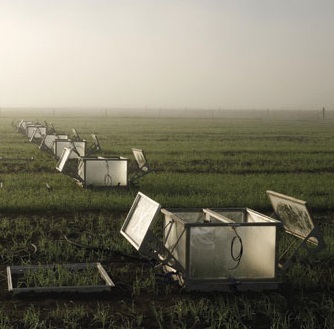Agriculture expert asks how farmers can mark carbon
 An Agricultural Economics expert wants to know how particular parts of the ‘direct action’ plan to reduce climate change will be applied, wondering how much farmers can expect to contribute.
An Agricultural Economics expert wants to know how particular parts of the ‘direct action’ plan to reduce climate change will be applied, wondering how much farmers can expect to contribute.
Dr Rohan Nelson from the University of Tasmania says he wants to know what measurements will be used in the plan to reward farmers for carbon abatement – carbon which is sequestered into healthy soil and not released into the atmosphere.
Dr Nelson says the Coalition needs to set out just how it will measure sequestration and whether it will play into Australia’s attempts to meet its carbon reduction obligations.
“The government will purchase the permits,” Dr Nelson says,
“The question under the direct action approach is much more about how stringent the environmental regulations are.”
Without being clear on the Government’s integrity or overarching environmental principles it is difficult to tell how they plan to administer the ‘direct action’ plan, and whether it will be direct or active enough.
The Coalition has previously said the near-identical measure put in place by the previous Government as the ‘Carbon Faming Initiative’ was too stringent in its assessments.
Dr Nelson helped institute the Carbon Faming Initiative, saying it was strict but “there are reasons for that, and the reasons for that stem from this idea of creating an asset that was saleable to the private market,” he said.
“Agriculture is 15 to 17 per cent of our national emissions... to what extent is agriculture going to participate in meeting targets like reducing our emissions by 5 per cent to 2020?” Dr Nelson asks, saying it is pointless without meeting international standards.
“If we don't meet the international protocols for doing that then we can't actually count that towards our targets. So it's an open question about whether agriculture needs to contribute to that and I think that's a debate that needs to be had.”
Dr Nelson is reportedly confident that the Coalition will come up with more details for its ‘direct action’ plan, but says it must be carefully balanced against global standards, domestic demand and the actual amount of emissions reduced.
“We can see the direct action as becoming more like a grants program that will look like some of the existing natural resource management programs that have existed through Caring for our Country and before that the Natural Heritage Trust and Landcare,” he said.
“We have to have a debate about to what extent is it important to get international recognition for that, as a secondary thing?”
“Of course the big issue in terms of making this commercial on farms is what is the transaction cost and how difficult is it for farmers to comply?”
“How much revenue can they expect to generate from selling these permits versus that compliance cost?”
The University of Tasmania seems to be a hotspot for forward-thinking climate science at the moment, with two researchers at the uni receiving the Tall Poppy Award this week. The awards are given for outstanding community engagement and scientific communication.








 Print
Print